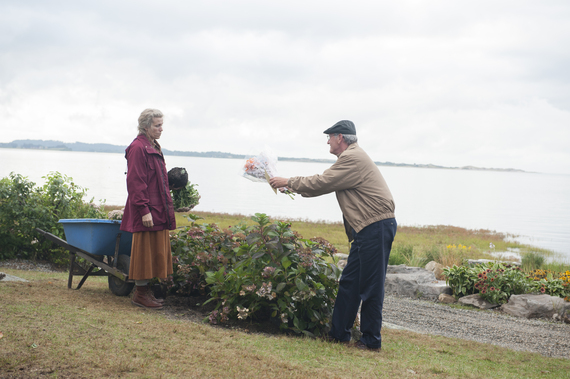I can't stop thinking about Olive Kitteridge. I hear her voice; see her face, run scenes over and over in my head and just want more.
I was surprised that loving the book so much didn't really matter when I saw the HBO mini-series, which is way too ugly a title for this film by Lisa Cholodenko, because Olive Kitteridge is stand-alone beautiful and I don't use that word lightly. I was profoundly moved by the story of this difficult woman in Maine all over again -- and that is a definition of cinematic art.
And at the risk of harking back to high school English paper themes like "Animal Imagery in Shakespeare's Macbeth" I did pick up on one of the many nuanced themes in this film and that is Olive and her garden.
Gardening in Maine can almost be an oxymoron -- her orderly, manicured and aesthetically perfect front garden stands in sharp contrast to the wild sea and cold skies of the Northeast. Yet she manages.
Olive is a fierce gardener, she yanks dead brush, digs deep holes, plucks snails and kicks away debris but the result, the result is not flowers, but blooms. That's what she calls them when she catches Henry cutting her tulips to take to his sad, widowed little Denise in episode 1.
"I was looking forward to the blooms," she says, "It's been a long winter"
The bright flowers are left scattered on the walk. And the cheaply colored store-bought flowers Henry presents to her at the very start of the first episode and later again to express his easy love for her are accepted with disdain because they're neither hard-won nor singularly perfect.
In episode 2 Olive's expression as she scornfully plucks out the offending baby's breath from a table arrangement at her son's wedding sums up her take on the whole manufactured hoopla, as does the scolding she gives to the flower girl when she catches her picking wild flowers. The whole affair offends her very clear sensibilities about nature and maybe even love. And when we watch Olive as she overhears the bride make fun of her mother-in-law's homemade (and perfect) floral dress we feel the cut and indeed, wonder with her why she even bothered.
In this same episode Olive intervenes in not one but two near-deaths -- while trying to distract former student Kevin in his car from imminent suicide she sees Penny from the coffee shop disappear over the cliff and dispatches Kevin to save her. When Penny later explains she was just picking flowers to cheer herself up Olive is not convinced. Because why exactly would that work?
And when Henry suffers his debilitating stroke it's while hauling big bags of mulch to Olive as she hacks away in the yard. Later she's adamant with the staff at the nursing home that they change the water in his wildflowers every day, which they don't do. And when she goes to visit her son and his new wife in Brooklyn their "happy" family back yard is in sharp contrast to her own -- toys strewn toys, bricks and dirt -- we're as relieved as Olive is to return home. Her skewed but laser like sensibilities are easily offended but also so rarely rewarded as to be real prizes. Like a perfect bloom.
Just like Olive embraces her depression, saying "it goes with being smart" so does an appreciation of well-earned beauty. Any good gardener would tell you that. It's an art, and art's not pretty.

